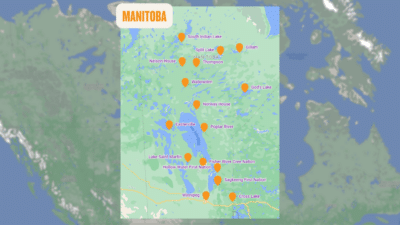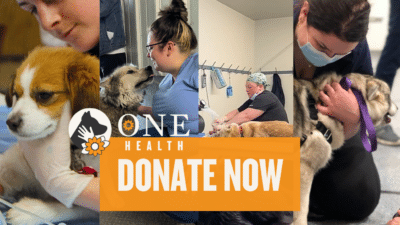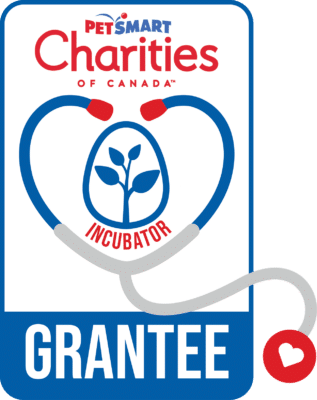One Health
In the spirit of reconciliation, One Health was developed to build trust, learn, co-create, and deliver community-engaged programming in underserved communities. Through One Health, we focus on the link between animal and human health and well-being. The program delivers external Northern/remote and internal clinics, offering a variety of services to both humans and animals who were previously lacking access.
Our Commitment to Reconciliation
When working with Indigenous communities, we recognize the importance of reconciliation and relationship-building. We strive to develop trusting and respectful relationships with community members and leadership to achieve long-term and positive partnerships and to assist with building healthy companion animal relationships and communities.
Please read our full Indigenous Relations Policy here.
One Health Services:
Spay/neuter clinics (external remote/Northern and in-house), vaccine clinics, pet food donations (when available), consulting for animal-related by-law development, knowledge sharing about dog bite prevention, dog behaviour and health education, and more.
“One Health is the interconnection between animals, people, and the environment – you can’t have healthy people without healthy animals and healthy environments; you can’t have a healthy environment without having healthy people and healthy animals. If you increase the health of all three together, then you increase the health of the whole community.”
– Jessica Miller, CEO, Winnipeg Humane Society
In Communities:
Operating from a reconciliation framework and working directly with Indigenous communities to provide access to affordable veterinary care in community, the One Health program addresses the Truth and Reconciliation Call to Action 19 (Health) to, “close the gaps in health outcomes between Indigenous and non-Indigenous communities.”
Each community is unique, and our team engages and collaborates with leadership and community members to identify the most significant areas of need. Sometimes the focus is on providing food and education, and others, it’s providing emergency veterinary care.
Where we’ve been:

Cross Lake, Norway House, Poplar River, Gillam/Fox Lake, Easterville, God’s Lake, Split Lake, Hollow Water First Nation, Thompson, Wabowden, Sagkeeng First Nation,
Fisher River Cree Nation, Lake Saint Martin, Nelson House, South Indian Lake, Winnipeg and others across the province.
BY THE NUMBERS:
Of the 63 First Nations communities in Northern Manitoba, there are only 2 (Thompson and The Pas) with regular access to veterinarians – and those clinics are overwhelmed with an unsustainable volume due to overpopulation and lack of spay and neuter procedures, injuries, and retention of veterinary teams.
There are 17 First Nations that aren’t accessible by an all-weather road. This accounts for about half of all First Nations people who live on a reserve in Manitoba. The One Health team charters planes and helicopters to transport equipment and staff.
In 2023, One Health visited 39 First Nations communities and set up remote clinics to support animal health and care.
In 2023, One Health completed 2,192 spay + neuter procedures and 761 vaccinations: doubling the number of procedures completed in 2021. This is only possible with the support from generous donors.
The average cost of one clinic is $15,000. The One Health program is currently funded for three years through the Province of Manitoba, corporate partners, and individual lead donors who share our vision of accessible veterinary care and healthy communities with strong relationships between companion pets and their caregivers.
The One Health Program has 3 full-time staff dedicated to outreach, coordination, management of the remote clinics, and relationship-building. These staff members travel to the clinics monthly and coordinate with community leaders and in collaboration with community organizations.
GET IN TOUCH
[email protected]
RESOURCES
Community Dog Book: https://researchers.usask.ca/tasha-epp/documents/community-dog-book-may.2018.pdf
IFAW educational resources: https://www.ifaw.org/ca-en/resources/register-to-receive-ifaws-indigenous-educational-resources
Save Rez Dogs: https://saverezdogs.com/resources



